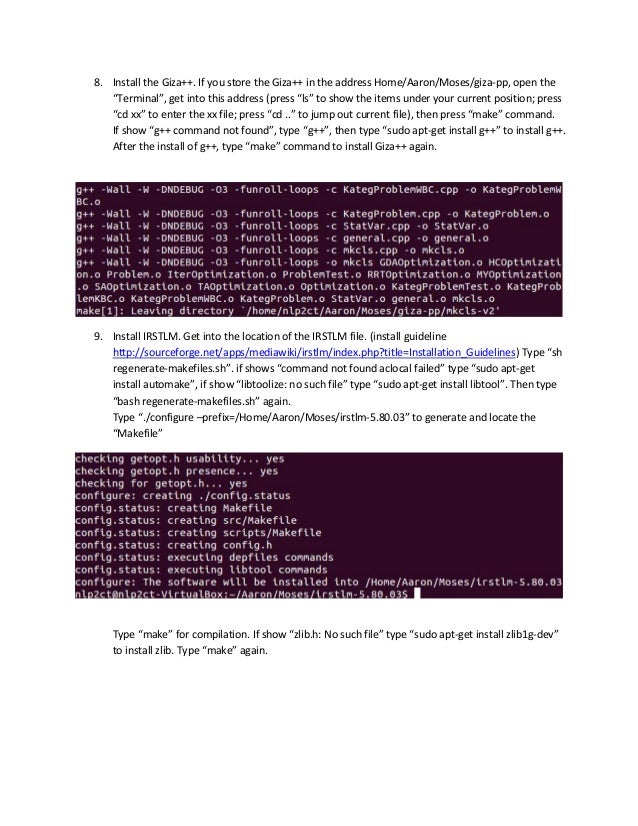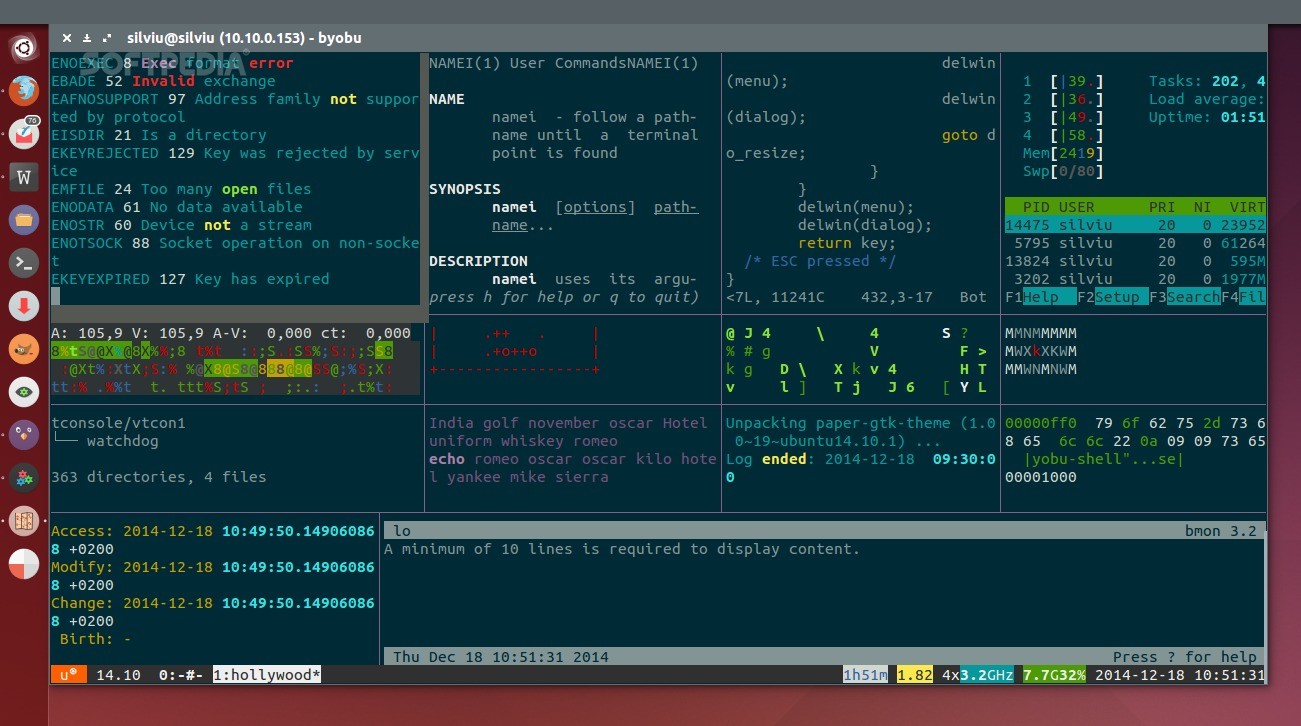- $ add-apt-repository -y ppa:mc3man/trusty-media $ apt-get update $ apt-get install -y git build-essential libargtable2-dev libsdl1.2-dev $ apt-get install -y ffmpeg libva-dev libsoxr-dev libvorbis-dev libbz2-dev zlib1g-dev libxvidcore-dev libvpx-dev libx264-dev libx265-dev libspeex-dev libfdk-aac-dev libvorbisenc2 libopus-dev libmp3lame-dev libdca-dev libfaac-dev libopencore-amrnb-dev libvo.
- How to install ZeroMQ on Ubuntu. Jun 16, 2015. permalink. Before installing, make sure you have installed all the needed packages. Sudo apt-get install libtool pkg-config build-essential autoconf automake sudo apt-get install libzmq-dev.
- Libtool hides the complexity of generating special library types (such as shared libraries) behind a consistent interface. To use libtool, add the new generic library building commands to your Makefile, Makefile.in, or Makefile.am. See the documentation for details. Libtool supports building static libraries on all platforms.
$ apt-get update $ apt-get source libttspico-utils. Before compiling the software, ensure to install some tools: # apt-get install autoconf libtool help2man libpopt-dev debhelper. After this, move to the svox folder and start compiling the software: $ cd svox- $ dpkg-buildpackage -rfakeroot -us -uc. Install GStreamer on Ubuntu or Debian. Run the following command: apt-get install libgstreamer1.0-0 gstreamer1.0-plugins-base gstreamer1.0-plugins-good gstreamer1.0-plugins-bad gstreamer1.0-plugins-ugly gstreamer1.0-libav gstreamer1.0-doc gstreamer1.0-tools gstreamer1.0-x gstreamer1.0-alsa gstreamer1.0-gl gstreamer1.0-gtk3 gstreamer1.0-qt5.
- 8Building and installing UHD from source code
Application Note Number
AN-445
Revision History

| Date | Author | Details |
|---|---|---|
| 2016-05-01 | Neel Pandeya | Initial creation |
Abstract
This Application Note provides a comprehensive guide for building, installing, and maintaining the open-source toolchain for the USRP (UHD and GNU Radio) from source code on the Linux platform. The Ubuntu and Fedora distributions are specifically discussed. Several other alternate installation methods are also discussed.
UHD on Linux
UHD is fully supported on Linux, using the GCC compiler, and should work on most major Linux distributions.
Devices
This document applies only to the USRP X300, X310, B200, B210, B200mini, N200, N210 devices. The E310 and E312 devices are embedded devices, and are fundamentally different from the other non-embedded USRP devices, and are not addressed by this document.
Install Linux
If you already have a recent version of Linux installed, then you may be able to skip this section. If you are starting from scratch, or simply want to start with a fresh new installation of Linux, then please follow the instructions and recommendations in this section.
We suggest that you use either Ubuntu 16.04.5, Ubuntu 18.04, Ubuntu 18.10, Fedora 27, 28, 29, and that you use a 64-bit architecture, not a 32-bit architecture. There are several re-spins of Ubuntu, such as Xubuntu, Lubuntu, Kubuntu, Linux Mint, all of which should also work. For the purposes of this document, these re-spins can be considered equivalent. Both Ubuntu and Fedora are known to work well with UHD and GNU Radio.
Download and install Ubuntu, Xubuntu, Linux Mint, or Fedora from the links below. Download the appropriate ISO image, and write it to a USB flash drive. Be sure to verify that the ISO file was not corrupted during the download process by checking the MD5 and/or SHA1 hash.
You can learn more about Ubuntu, Xubuntu, Linux Mint, and Fedora at the links below.
There are many tools for writing an ISO image to a USB flash drive. In Linux, you can use the 'dd' utility, or the UNetbootin utility. On Ubuntu systems, there is also the Startup Disk Creator utility as well.
Be sure to use a USB flash drive with at least 8 GB capacity, and use a USB 3.0 flash drive, not a USB 2.0 flash drive. If you use a slower USB 2.0 flash drive, then the install process will take significantly longer.
Update and Install dependencies
Before building UHD and GNU Radio, you need to make sure that all the dependencies are first installed.
However, before installing any dependencies, you should first make sure that all the packages that are already installed on your system are up-to-date. You can do this from a GUI, or from the command-line, as shown below.
On Ubuntu systems, run:
On Fedora 21 systems, run:
On Fedora 22, 23, 24 and 25 systems, run:
Once the system has been updated, then install the required dependencies for UHD and GNU Radio.
On Ubuntu 20.04 systems, run:
On Ubuntu 18.10 systems, run:
On Ubuntu 18.04 systems, run:
On Ubuntu 17.04 systems, run:
On Ubuntu 16.04 systems, run:
On Ubuntu 15.04 and 15.10 systems, run:
On Ubuntu 14.04 and 14.10 systems, run:
On Fedora 21 systems, run:
On Fedora 22, 23, 24 and 25 systems, run:
After installing the dependencies, you should reboot the system.
If the installation of the dependencies completes without any errors, then you can proceed to build and install UHD and GNU Radio.
Building and installing UHD from source code
UHD is open-source, and is hosted on GitHub. You can browse the code online at the link below, which points to version 3.14.0.0, which is the the latest release at the time of this writing.
There are several good reasons to build GNU Radio from source code, especially for doing development and prototyping. It it enables an easy way to customize the location of the installation, and to install multiple UHD versions in parallel, and switch between them. It also provides much more flexibility in upgrading and downgrading versions, and allows the user to modify the code and create customized versions, which could possibly include a patch or other bug-fix.
To build UHD from source code, clone the GitHub repository, check out a branch or tagged release of the repository, and build and install. Please follow the steps below. Make sure that no USRP device is connected to the system at this point.
First, make a folder to hold the repository.
Next, clone the repository and change into the cloned directory.
Next, checkout the desired UHD version. You can get a full listing of tagged releases by running the command:
Example truncated output of git tag -l:
Note: As of UHD Version 3.10.0.0, the versioning scheme has changed to be a quadruplet format. Each element and version will follow the format of: Major.API.ABI.Patch. Additional details on this versioning change can be found here.
After identifying the version and corresponding release tag you need, check it out:
Next, create a build folder within the repository, invoke CMake and build UHD.
Next, you can optionally run some basic tests to verify that the build process completed properly.
Next, install UHD, using the default install prefix, which will install UHD under the /usr/local/lib folder. You need to run this as root due to the permissions on that folder.
Next, update the system's shared library cache.
Finally, make sure that the LD_LIBRARY_PATH environment variable is defined and includes the folder under which UHD was installed. Most commonly, you can add the line below to the end of your $HOME/.bashrc file:
On Fedora 22/23/24/25 you will need to set the LD_LIBRARY_PATH to /usr/local/lib64.
If the LD_LIBRARY_PATH environment variable is already defined with other folders in your $HOME/.bashrc file, then add the line below to the end of your $HOME/.bashrc file to preserve the current settings.
For Fedora 21/22/23/24/25
For this change to take effect, you will need to close the current terminal window, and open a new terminal.
At this point, UHD should be installed and ready to use. You can quickly test this, with no USRP device attached, by running uhd_find_devices. You should see something similar to the following.
Downloading the UHD FPGA Images
You can now download the UHD FPGA Images for this installation. This can be done by running the command uhd_images_downloader.
Sudo Apt-get Install Autoconf Automake Libtool
Note: Since this installation is being installed to a system level directory (e.g. /usr/local), the uhd_images_downloader command requires sudo privileges.
Example ouput for UHD 3.13.3.0:
Example output for UHD 3.13:
Building and installing GNU Radio from source code
As with UHD, GNU Radio is open-source and is hosted on GitHub. You can browse the code online at the link below, which points to version v3.7.13.4, which is the the latest release at the time of this writing.
Note: GNU Radio is currently transitioning from major branches of 3.7.x.x to 3.8.x.x. It is generally recommend at this time to use either the v3.7.13.4 or maint-3.7 branch of GNU Radio. The master branch includes many major changes such as converting to use Python 3 and may be unstable.
As with UHD, there are several good reasons to build GNU Radio from source code, especially for doing development and prototyping. It it enables an easy way to customize the location of the installation, and to install multiple GNU Radio versions in parallel, and switch between them. It also provides much more flexibility in upgrading and downgrading versions, and allows the user to modify the code and create customized versions, which could possibly include a patch or other bug-fix.
Similar to the process for UHD, to build GNU Radio from source code, clone the GitHub repository, check out a branch or tagged release of the repository, and build and install. Please follow the steps below. Make sure that no USRP device is connected to the system at this point.
First, make a folder to hold the repository.
Next, clone the repository.
Next, go into the repository and check out the desired GNU Radio version.
To checkout the v3.7.13.4 branch:
Or to checkout the maint-3.7 branch:
Next, update the submodules:
Next, create a build folder within the repository, invoke CMake, and build GNU Radio:
Next, you can optionally run some basic tests to verify that the build process completed properly.
Next, install GNU Radio, using the default install prefix, which will install GNU Radio under the /usr/local/lib folder. You need to run this as root due to the permissions on that folder.
Finally, update the system's shared library cache.
At this point, GNU Radio should be installed and ready to use. You can quickly test this, with no USRP device attached, by running the following quick tests.
There is a simple flowgraph that you can run that does not require any USRP hardware. It's called the dialtone test, and it produces a PSTN dial tone on the computer's speakers. Running it verifies that all the libraries can be found, and that the GNU Radio run-time is working.
You can try launching the GNU Radio Companion (GRC) tool, a visual tool for building and running GNU Radio flowgraphs.
If 'gnuradio-companion' does not start and complains about the PYTHONPATH environment variable, then you may have to set this in your $HOME/.bashrc file, as shown below.
On Fedora 21/22/23/24, the PYTHONPATH environment variable will need to be set to:
Configuring USB
On Linux, udev handles USB plug and unplug events. The following commands install a udev rule so that non-root users may access the device. This step is only necessary for devices that use USB to connect to the host computer, such as the B200, B210, and B200mini. This setting should take effect immediately and does not require a reboot or logout/login. Be sure that no USRP device is connected via USB when running these commands.
Configuring Ethernet

For USRP devices that use Ethernet to connect to the host computer, such as the N200, N210, X300, X310, set a static IP address for your system of 192.168.10.1, with a netmask of 255.255.255.0. The default IP address of the USRP is 192.168.10.2, with a netmask of 255.255.255.0. You should probably set the IP address using the graphical Network Manager. If you set the IP address from the command line with ifconfig, Network Manager will probably overwrite these settings.
Connect the USRP
The installation of UHD and GNU Radio should now be complete. At this point, connect the USRP to the host computer.
If the interface is Ethernet, then open a terminal window, and try to ping the USRP with 'ping 192.168.10.2'. The USRP should respond to the ping requests.
If the interface is USB, then open a terminal window, and run 'lsusb'. You should see the USRP listed on the USB bus with a VID of 2500 and PID of 0020, 0021, 0022, for B200, B210, B200mini, respectively.
Also try running 'uhd_find_devices' and 'uhd_usrp_probe'.
Thread priority scheduling
When UHD spawns a new thread, it may try to boost the thread's scheduling priority. If setting the new priority fails, the UHD software prints a warning to the console, as shown below. This warning is harmless; it simply means that the thread will retain a normal or default scheduling priority.
To address this issue, non-privileged (non-root) users need to be given special permission to change the scheduling priority. This can be enabled by creating a group usrp, adding your user to it, and then appending the line @usrp - rtprio 99 to the file /etc/security/limits.conf.
Then add the line below to end of the file /etc/security/limits.conf:
You must log out and log back into the account for the settings to take effect. In most Linux distributions, a list of groups and group members can be found in the /etc/group file.
There is further documentation about this in the User Manual at the link below.


Apt-get Install Libtoolize
- sudo apt-get install build-essential libtool autotools-dev autoconf pkg-config libssl-dev libevent-dev
- sudo apt-get install libboost-all-dev
- sudo add-apt-repository ppa:bitcoin/bitcoin
- sudo apt-get update
- sudo apt-get install libdb4.8-dev libdb4.8++-dev
- sudo apt-get install libqt5gui5 libqt5core5a libqt5dbus5 qttools5-dev qttools5-dev-tools libprotobuf-dev protobuf-compiler
- sudo apt-get install git
- sudo apt-get install build-essential libtool autotools-dev automake pkg-config libssl-dev libevent-dev bsdmainutils
- sudo apt-get install libboost-system-dev libboost-filesystem-dev libboost-chrono-dev libboost-program-options-dev libboost-test-dev libboost-thread-dev
- sudo apt-get install libboost-all-dev
- sudo apt-get install software-properties-common
- sudo add-apt-repository ppa:bitcoin/bitcoin
- sudo apt-get update
- sudo apt-get install libdb4.8-dev libdb4.8++-dev
- sudo apt-get install libminiupnpc-dev
- sudo apt-get install libzmq3-dev
- sudo apt-get install libqt5gui5 libqt5core5a libqt5dbus5 qttools5-dev qttools5-dev-tools libprotobuf-dev protobuf-compiler
- sudo apt-get install libqt4-dev libprotobuf-dev protobuf-compiler
- Sudo apt-get install automake